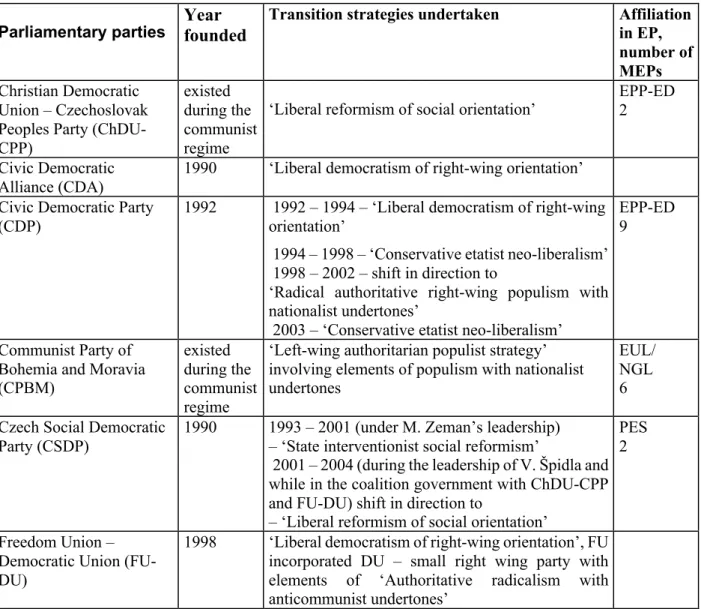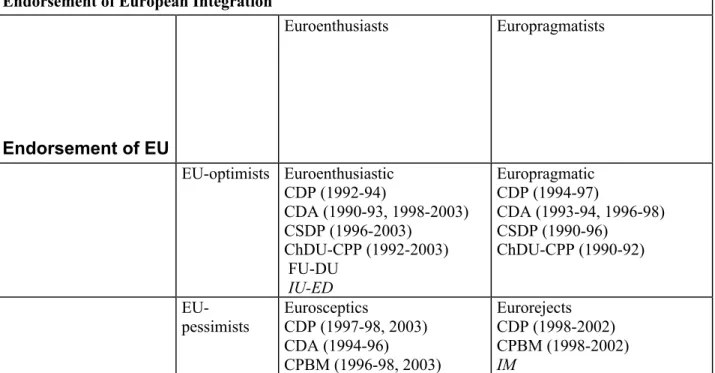The second sub-period in focus was the period from the accession to the EU in 2004 to the shock wave of the reconstitution of the Czech political scene in 2013 after the collision of governmental-parliamentary-clan-clientelistic structures and the resignation of the Czech government. The theoretical basis of the study was developed from the recognition of four waves in the conceptualization of social changes in CEE - in the form of a 'scheme of stages' (transition-democratic consolidation; dependence on the path of transformation; capture of the state-Europeanization; variants of one's own pattern of capitalism). ) and the extension of this theoretical basis to more general theories of social dynamics and theoretical controversy: pluralist theory versus the systemic crisis approach; neoclassical approach versus institutional economics; cultural criticisms for understanding social change). The reflection of the management crisis in the Czech Republic in the Czech social sciences in the pre-ANA era……….
Events at the turn of 2012/2013 and throughout 2013 can be interpreted in political terms as a certain measure in the development of the overlaps that operate on the borderline of politics and economics in the Czech Republic. The presidential amnesty of January 2013 effectively and irreversibly halted or pardoned most of the ongoing court cases stemming from events in the 90s and at the start of the new millennium. As a result, a new questionable era arose as many of the accompanying events led to both positive and negative implications3 that emerged against the background of more profound recognition of questionable characteristic mechanisms of overlapping politics and the economic.
1 Together with deeper changes in the functioning of the prosecution service that have enabled such police intervention, in particular by limiting political interference and illegally passing information about criminal investigations undertaken to investigated parties. 5 Associating these events with the avalanche of initial reform developments in the first half of the 1990s.
Theoretical and Methodological Introduction
Introductions as They Might Have Been
Four Waves of Conceptualizing Social Change in CEE: Transition,
- Transition or Transformation?
- Transformation and Path-dependency
- State Capture of Varieties of Capitalism?
With the deconstruction of real-socialist regimes, often in the form of real collapse and rapid disintegration of the existing ones. Economic crisis mainly emerges in the course of the mutual interference of the private sector and state administration. The dubious character of the changes in the financial sphere was initially indicated by the first wave of bankruptcies.
In the ordinary, the 'image of dynamics' of a departure from real socialism prevails. The reflection of the management crisis in the Czech Republic in the Czech social sciences226 in the era before ANO. Vladimíra Dvořáková predicted the coming climax of the crisis of governance in the Czech Republic in her work Rozkládání/Rozkrádání státu.
The company later deducted bribes paid during the privatization of the Czech telecom from its Dutch tax return. However, our reappraisal of the sharp distinction between public and private became more complex as the study progressed.

General Social Dynamics Theories and the Region-Specific Conceptualizations. 38
- Neoclassical Approach versus Institutional Economics
- Culture-based Reproaches for Understanding Social Change
Beyond Privatization and Europeanization: The Czech Republic Case
How the Story of Privatization May be Told and, Frequently, a Great Deal is
- Definitions, Designs, and Experiments
- The actual undertakings
- The implications
Structure of Grey Zones and Grey Phenomena in the period 1995 – 2004 versus
- Post-privatization/Secondary Privatization Characteristic Patterns and
- Political Science Note: Towards 2004 EU membership – Emergence of
Firms and enterprises belong to the other group of economic entities that were widely affected by common tunneling in the Czech Republic during the 90s and the beginning of the new millennium. Is this another, broader dimension of the 'world unto itself', albeit identified in the context of a particular revealed political party. ChDP-CPP, or even newer, somewhat similar parties, which have their origins only at the end of the first decade of the new millennium (TOP 09, Mayors and Independents165) can be expected even in the case of less orthodox parties that have just entered the establishment (Pirates).
168 In some cases, their personal origins lie in the complex interweaving of the bourgeois milieu and the milieu appointed by the pre-1989 regime (Mrázek). This radical development of the attitude towards them, however, hides deeper events in the networks surrounding the Social Democratic Party. Depoliticization of the civil service was one of the main preconditions for EU membership.
If we open the question of the impact and influence of the EU within the aforementioned waves of operational programs of the first full-fledged entity. 199 A characteristic precursor from the period before the accession to the EU, both in terms of form (internationally carried out corrupt practices) and in terms of the enormous amount of public funds involved in the corruption situation in this specific sector, was the lease of the JAS 39 fighter aircraft from the British-Swedish consortium (last proven to be involved in an act of international corruption in this case - under the British legal system, the arms company BAE Systems was forced to pay a large fine as punishment). 203, i.e. 'post-privatisation/secondary privatisation' in the specific sense of the gray – disruptive and appropriative nature of these changes.
A sure reminder in the Czech context is the 'initiation' copy of the PPP project of the D47 highway from Lipnik nad Bečvou to the Polish border. In the Czech context, the contours of the predominant attachment to these two perspectives can be determined to some extent by the field. The issue of political clientelism as arising from the practice of implementing the initial privatization plan.
The rise of the Czech political scene with the long-term effect of raising new dividing lines. Similar revelations led to the decisive decline and even to the exit of the Civic Democratic Alliance from the political system. In the Euro-Atlantic context, such mechanisms and practices would be considered clear and outrageous violations of the rule of law.
The developments in MOE thus suggest a certain re-evaluation of the clear distinction between public and private. The dynamics of the spill-over effect in the specific MOE context appear to be somewhat more complex. Most of these legislative proposals or the most serious problem areas replicated or largely overlapped with the critical problem areas at the time in the first half of the 1990s.
Appian - also the privatization of the rest of Škoda Plzeň by state restructuring agent Martin Romano (later CEO of ČEZ; Škoda Plzeň rebuilds ČEZ's coal-fired power plants).

